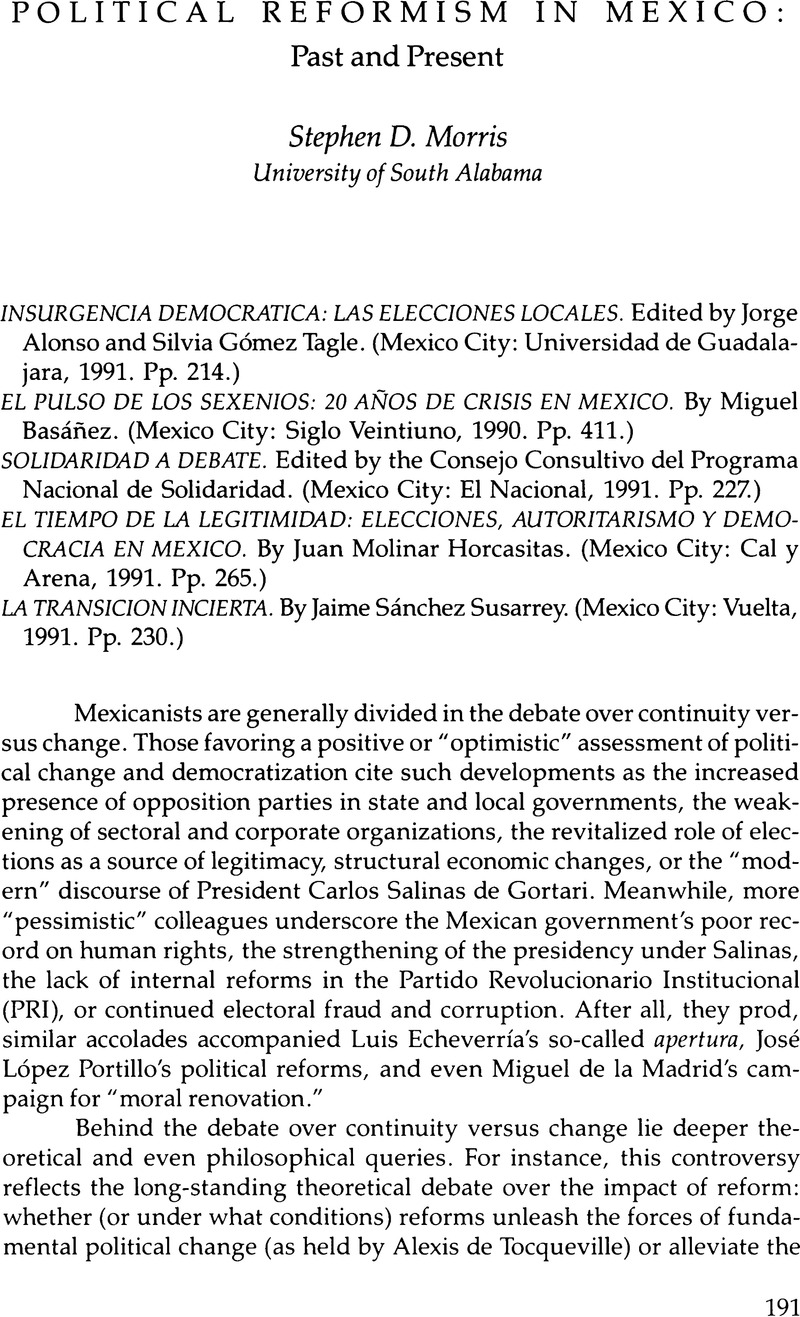No CrossRef data available.
Published online by Cambridge University Press: 12 October 2022

1. This debate is discussed at length in Samuel P. Huntington, Political Order in Changing Societies (New Haven, Conn.: Yale University Press, 1968), 346–64.
2. Crisis analyses has long dominated the study of Mexican politics. In fact, the term has found its way into the titles of a host of books for more than twenty years. Curiously, reform (or reformism), the antithesis of crisis, has rarely been so honored. The best collection outlining the latest crisis as of 1989 is Mexico's Alternative Political Future, edited by Wayne A. Cornelius, Judith Gentleman, and Peter H. Smith (La Jolla: Center for U.S.-Mexican Studies, University of California, San Diego, 1989). Although many analysts have focused on reform, one of the best treatments remains John J. Bailey's Governing Mexico: The Statecraft of Crisis Management (New York: St. Martin's Press, 1988).
3. Although Basáñez's argument on this point is sound, he never really addresses the reasons for this tendency. Is it because the contradiction between the popular and capitalist origins of the Mexican state is irresolvable, or is it due to a lack of political leadership, or is it because addressing symptoms is simply the political path of least resistance?
4. Despite the book's title, Basáñez does not explain why crises seem to concentrate in the latter years of the sexenios, or conversely, why the system's capacity for reform seems to weaken at this point. For an exploration of this point with regard to anticorruption campaigns, see my Corruption and Politics in Contemporary Mexico (Tuscaloosa: University of Alabama, 1991).
5. This view clearly parallels Bailey's assessment in Governing Mexico.
6. On the changing nature of labor-state relations, see Kevin J. Middlebrook, “The Sounds of Silence: Organized Labour's Response to Economic Crisis in Mexico,” Journal of Latin American Studies 21, pt. 2 (1989): 195–220; and the series of articles in Revista Mexicana de Sociología 52, no. 3 (1990):97–212.
7. Sánchez correctly points out that in contrast to Salinas's intervention in the elections in Baja California in 1989, he did not intervene to overturn fraud in the concurrent Michoacán elections because he had no dialogue with the Cardenistas to protect. Yet what Sánchez fails to appreciate, in my view, is the role played by Cárdenas's confrontational strategy in facilitating the PRI government's willingness to bargain with PAN and PAN's strategy of gradualism.
8. I must take exception to Sánchez on this point. The relegitimization of the Mexican state and the PRI since 1988 has clearly resulted from Salinas's acts as president and his adroit political style rather than from elections. It is undeniable that his election was not the source of his legitimacy and that the 1991 electoral recovery of the PRI was a result of this renewed legitimacy not its cause.
9. Unofficially, Salinas has removed more state governors than any of his predecessors. At last count, as many as nine state executives have been removed (transferred) during the first half of the Salinas term: those in Veracruz, Jalisco, Baja California, Guerrero, Michoacán, Yucatán, San Luis Potosí, Guanajuato, and Tabasco. The efficacy of this strategy is attested by the ability of Chihuahua Governor Fernando Baeza to ease tensions in his state following the 1986 electoral debacle (massive fraud that was later censured by the Organization of American States) and to garner subsequent electoral gains for the PRI.
10. Despite the intentions expressed in the PRI's fourteenth assembly in 1990 to democratize the selection of candidates, party documents indicate that well over 90 percent of the PRI candidates for the chamber of deputies in 1991 were “unity candidates” selected by the traditional dedazo method. Party preparations for numerous 1992 elections indicate the same pattern.
11. I refer here to Charles W. Anderson, Politics and Economic Change in Latin America (Toronto: Van Nostrand, 1967).
12. A recent poll published in the October 1991 issue of Este País provides clear empirical support for the role of Solidaridad in boosting the government's image and hence the PRI's electoral appeal. Although the poll showed that a resounding majority of Mexicans have a favorable opinion of the program, such approval was inversely related to social class, with upper- and middle-class respondents expressing higher levels of support.
13. Susan Eckstein arrived at a similar conclusion: that democratic opening at the local level serves to broaden the regime's base of legitimation and authoritarian rule. See Eckstein, “Formal versus Substantive Democracy: Poor People's Politics in Mexico City,” Mexican Studies/Estudios Mexicanos 6, no. 2 (1990):213–39. On the role of dialogue and concertation in the government's treatment of rural forces, see Luisa Paré, “The Challenges of Rural Democratization in Mexico,” Development Studies 26, no. 4 (1990):79–96.
14. Quote taken from a collection of writings stemming from the unpublished document “Convocatoria a la modernización de México del Presidente Carlos Salinas de Gortari,” June 1991, p. 6.
15. See Soledad Loaeza, “La vía mexicana a la democracia,” Nexos, no. 166 (Oct. 1991): 23–26.
16. See note 13.
17. Sec Judith Adler Hellman “Continuity and Change in Mexico,” LARR 23, no. 2 (1988): 133–56; and Kevin J. Middlebrook, Political Liberalization in an Authoritarian Regime (La Jolla: Center for U.S.-Mexican Studies, University of California, San Diego, 1985).
18. A corollary to this dilemma involves the question raised earlier about internal reforms of the PRI. On a theoretical level, many analysts assume a positive correlation between democratization of the PRI and democratization of the system in the belief that general democratization requires internal democratic reforms in the PRI. Yet the current situation seems to suggest the opposite: an increase in system democratization (such as freer elections) in the absence of democratic reforms within the party.
19. Huntington, for example, cites centralization of power as a requirement for both reform and revolution. See Huntington, Political Order in Changing Societies, 355.